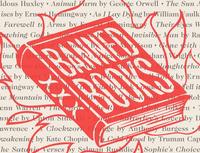In honor of National Library Week, we’re celebrating not just our beloved Free Library and its amazing librarians and staff, but the role of libraries in the 21st century. Chief among these roles is promoting freedom of information, ensuring works of varying viewpoints are accessible to all.
Libraries can open up a diverse world of books and programs for readers of all ages—here at the Free Library, we host more than 25,000 programs each year, including more than 15,000 for preschoolers, children, and teens.
But sometimes, this diverse world of books can cause people to take pause. The American Library Association (ALA) explains that "with the best intentions—to protect others, frequently children, from difficult ideas and information," people—adults—attempt to remove or restrict material from a library or curriculum, based upon the objections of a person or group—better known as a book challenge. The top reasons material tends to be challenged: for being "sexually explicit," containing "offensive language," and being "unsuited to age group."
Today the ALA released the State of America’s Libraries Report, which includes the Top Ten Most Challenged Books of 2017, compiled from analysis by the ALA’s Office for Intellectual Freedom (OIF). Out of 354 challenges recorded by the OIF, the most challenged books of 2017 were...
Thirteen Reasons Why by Jay Asher
Originally published in 2007, this New York Times bestseller has resurfaced as a controversial book after Netflix aired a television series by the same name. This YA novel was challenged and banned in multiple school districts because it discusses suicide.
The Absolutely True Diary of a Part-Time Indian by Sherman Alexie
Consistently challenged since its publication in 2007 for acknowledging issues such as poverty, alcoholism, and sexuality, this National Book Award winner was challenged in school curricula because of profanity and situations that were deemed sexually explicit.
Drama by Raina Telgemeier
This Stonewall Honor Award–winning, 2012 graphic novel from an acclaimed cartoonist was challenged and banned in school libraries because it includes LGBT characters and was considered "confusing."
The Kite Runner by Khaled Hosseini
This critically acclaimed, multigenerational novel was challenged and banned because it includes sexual violence and was thought to "lead to terrorism" and "promote Islam."
George by Alex Gino
Written for elementary-age children, this Lambda Literary Award winner was challenged and banned because it includes a transgender child.
Sex Is a Funny Word, written by Cory Silverberg and illustrated by Fiona Smyth
This 2015 informational children’s book, written by a certified sex educator, was challenged because it addresses sex education and is believed to lead children to "want to have sex or ask questions about sex."
To Kill a Mockingbird by Harper Lee
This Pulitzer Prize–winning novel, considered an American classic, was challenged and banned because of violence and its use of the N-word.
The Hate U Give by Angie Thomas
Despite winning multiple awards and being the most searched-for book on Goodreads during its debut year, this YA novel was challenged and banned in school libraries and curricula because it was considered "pervasively vulgar" and because of drug use, profanity, and offensive language.
And Tango Makes Three, written by Peter Parnell and Justin Richardson, illustrated by Henry Cole
Returning after a brief hiatus from the Top Ten Most Challenged list, this ALA Notable Children’s Book, published in 2005, was challenged and labeled because it features a same-sex relationship.
I Am Jazz, written by Jessica Herthel and Jazz Jennings, illustrated by Shelagh McNicholas
This autobiographical picture book, cowritten by the 13-year-old protagonist, was challenged because it addresses gender identity.
Often book challenges occur at the local level, with a group attempting to remove material from the school curriculum or library. Sometimes, such challenges reach higher levels, resulting in court cases and proposed legislation.
In 1982, a complaint to a New York school board about certain books on school library shelves—including Slaughterhouse Five by Kurt Vonnegut and Best Short Stories of Negro Writers—reached the Supreme Court. In Island Trees School District v. Pico, the Court ruled that a public school cannot remove books from the school library because its staff or community members disagree with the content. (The ruling did permit, however, the removal of books with content deemed "inappropriate" for the children of the school, e.g., books with sexual content in an elementary school.)
Yet in 1988, the Supreme Court case Hazelwood v. Kuhlmeier upheld school personnel’s right to prohibit school newspaper articles on topics deemed "inappropriate." A bill currently before the Missouri state senate, the Cronkite New Voices Act, seeks to restore students’ First Amendment rights.
The ALA has found that authors of color, as well as books with diverse content, are disproportionately challenged and banned.
Citing sources from John Stuart Mill to Supreme Court Justice William J. Brennan, Jr., the ALA holds a position promoting "the freedom to choose or the freedom to express one's opinions even if that opinion might be considered unorthodox or unpopular, and stresses the importance of ensuring the availability of those viewpoints to all who wish to read them."
So this week (and all other weeks, in Library Land), we raise a book to the freedom to seek and express ideas. Read on, Library lovers!
Have a question for Free Library staff? Please submit it to our Ask a Librarian page and receive a response within two business days.

